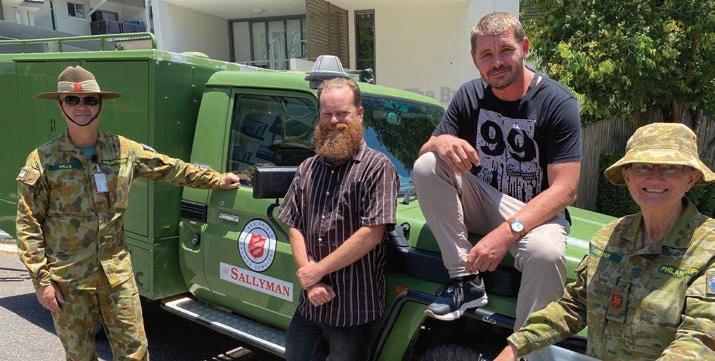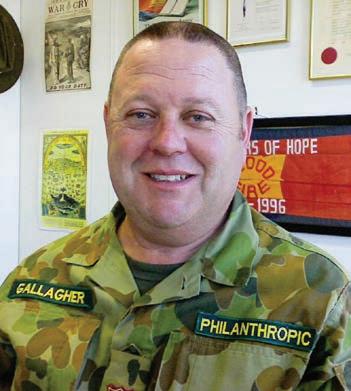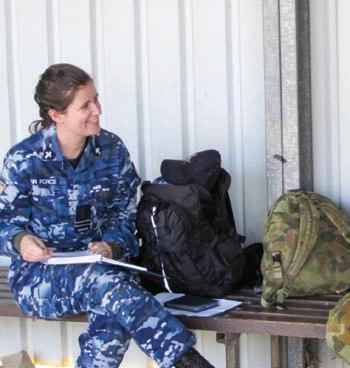
3 minute read
Lest we forget
A new response for forgotten veterans
Words Anthony Castle
Advertisement
There can be an increasing distance between the veterans who often come to mind on Anzac Day, and the lived experience of those who have served more recently. The Salvation Army’s Red Shield Defence Services (RSDS) team of philanthropic representatives currently support servicepeople every day, and the recent Royal Commission into Defence and Veteran Suicide has raised real concerns about the risks faced by many of today’s younger ex-servicepeople.

“i think we can have those two pictures of veterans in our mind,” explains The Salvation Army’s Major Brett Gallagher, Chief Commissioner of the RSDS. “Old black and white footage of young
Australians and the older people who march on Anzac Day – we don’t always understand that we have a large cohort of people in their 20s who are now veterans in our community.”
Veterans Young And Old
A veteran is defined as anyone who has served even one day in defence, whether still serving or ex-serving. This can sometimes be at odds with the expectations of the general public, especially on occasions such as Anzac Day.
“That’s a hard switch for our community to take, that a veteran can be still quite young, and may not have fired a weapon in anger or had a weapon fired at them. You could be dealing with veterans and may not even know it,” Brett says.
The RSDS provide refreshments to soldiers and officers during their training activities. The team supports those serving on base, at military training areas around the country, and have even been on rotation to the Middle East region.
“We’re just starting to see what the impact is for this 20-year conflict, for young veterans who were asked to go to iraq and Afghanistan,” says Brett. “We’ve worked with WWi and WWii veterans and veterans from Korea and Vietnam, but each cohort has their own underlying challenges.”
Recent Conflicts
Australia had been at war in the Middle East region for the last two decades, but those conflicts can sometimes be underestimated as we remember those who fell a century ago.
“They’ve lost mates, they saw things they were powerless to change,” Brett explains. “it strikes deep into the heart of people. We’re seeing that start to work out as they leave defence and are trying to cope with what that service meant for them.”
The Royal Commission into Defence and Veteran Suicide was established in 2021 to inquire into the issues and risks for those who have served. More than 1600 Australian veterans and serving personnel have died by suicide in the past two decades, and Australia has lost more personnel to suicide than through operations over the last 20 years in Afghanistan and iraq.
“in many places, veterans are one of the most in-need cohorts because of the co-morbidities caused by their service and how they attempt to deal with their issues post-service,” says Brett. “We also know that we’re supporting veterans through a number of our Alcohol and Other Drugs centres, and that veterans’ families present to our Family and Domestic Violence services. Our hope is that we can present a program that can connect veterans’ needs to the relevant services in a consistent way.”
The Royal Commission’s interim report found that, as at the end of May 2022, the Department of Veterans Affairs had a backlog of nearly 42,000 claims for compensation.
“Services can be underfunded, not done well, or people don’t know what they offer,” explains Alexis McKeand,
Veterans Ministries Co-ordinator. “Think about Centrelink. You can be on the phone for hours, your claim going from one person to the next. Veterans’ services can be similar.”
We’re talking about people who defend our country – how
can we make their lives better?
Current Challenges
Alexis is on base with the Royal Australian Air Force, serving in roles with the Air Force and The Salvation Army. She engages with the findings of the Royal Commission, researching the challenges that veterans face in community, in services, even defence itself.

“i read about one ex-serving woman who was homeless and finally went into a service,” Alexis shares. “When she was identified as a veteran, she answered ‘no’, because she hadn’t served in war. Even within defence there can be a confusion or a stigma there, that if they haven’t gone to war, they don’t deserve support.”
The work of the RSDS going forward will be to develop The Salvation Army’s national framework for veterans – a consistent response across services and training so that help and support can be provided.
“We’re talking about people who defend our country,” Alexis says. “The people i meet give their whole lives to do their best and make sure we’re safe. They put their bodies and minds and families on the line. How can we make their lives better, whether they’ve served two days or 20 years?”
The Royal Commissioners are required to provide a final report in June, and The Salvation Army will begin to build new supports for the newest veterans.
“Once the Royal Commission releases its findings, we will identify the areas we can best respond to,” says Brett. “There is a holistic approach that we can be taking, to have a system that knows how to support veterans, not just with the issues they’re presenting with, but a whole of life response.”
For information on the Salvos Veteran Support Team, go to bit.ly/40mk6ra
To read the ADF reports on veteran suicide, go to dva.gov.au
Scan here for more information on Salvation Army Homelessness Support Services.




